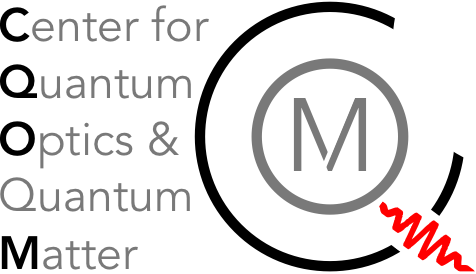CQOM Seminar, Dr. Caroline Champenois and Prof. Roee Ozeri
Info about event
Time
Program
10:00-10:15: Coffee and buns
10:15-11:00: Dr. Caroline Champenois, PIIM, Aix-Marseille Universite-CNRS, France
Title:
A three-(optical) photon coherent population trapping demonstrated in a cloud of trapped ions.
Abstract:
The three photon coherent population trapping identified in [1] for calcium-like ions is observed in a cloud of several hundreds of laser-cooled calcium ions in an RF-linear quadrupole trap. This coherent process takes the ions to a dark state built on the linear superposition of the ground state and the two fine structure components of the metastable D-state which can serve as optical or THz qu-bits. The advantage of a coherent three-photon process compared to two-photon one lies in the possibility of exact cancellation of the first order Doppler shift, even for very different wavelengths: 397, 729 and 866 nm in our case. The dark line is referenced to the magnetic dipolar transition between the two D-states and could serve as a THz frequency standard [2]. To take full advantage of this dark line, we use a dedicated frequency comb to simultaneously lock the 3 involved lasers and constrain their relative phase fluctuations.
References:
[1] C. Champenois, G. Morigi, J. Eschner, Phys. Rev. A 74 053404 (2006).
[2] C. Champenois, G. Hagel, M. Houssin, M. Knoop, C. Zumsteg, and F. Vedel, Phys. Rev. Lett. 99 013001 (2007).
11:00-11:15: Break
11.15-12:00: Prof. Roee Ozeri, Weizmann Institute of Science, Israel
Title:
Precision Spectroscopy in engineered subspaces
Abstract:
Noise limits the coherence of quantum superpositions thus compromising the precision with which spectroscopy can be performed. In the field of quantum information processing several methods were developed that mitigate the effect of noise on quantum coherence. Examples include dynamic decoupling (DD), decoherence-free-subspaces (DFS) and quantum error-correction codes. In this talk I will describe the use of Hilbert space engineering to improve on the precision of spectroscopy in trapped-ion experiments, and their implication on the detection of new fundamental physics.
Download: Pdf version
Contact: Michael Drewsen, drewsen@phys.au.dk, +45 23382354

